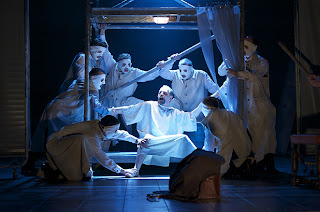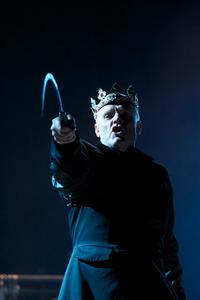34
Richard III, Propeller Theater, Boston MA, Directed by Edward Hall.
Richard III, Propeller Theater, Boston MA, Directed by Edward Hall.
"Now is the Winter of our discontent, made summer by this son of York." These meaningful lines escaped the lips of the crippled brother to prince of England to begin Shakespeare's darkest and most sinister play. The play began with one, white clad, masked figure came to the front of the stage. He sat, perfectly still staring out into the audience. The audience looked at him, quieted down and started to pay attention. But nothing happened. The audience went back to their original banter. They hardly noticed the second, and the third. Soon ten men dressed in white stopped motionless on the stage. Creak. The audience hushed. Creak. Thud. Creak. Thud. A metal boot crashed onto the stage, then a foot, then the boot, then the foot. Richard the Third limped his nature-beaten body onto the stage. His white hair was slicked back onto his head. He was older, but not old. His left harm hung uselessly by his side. In that moment, I almost felt bad for him. I sympathized with his pain. I almost understood why he could be so evil.
Another murder by Richard
But as the play went on, I lost sympathy quickly. The play was blank staged, with only a metal frame and a platform in the background. And every time a courtier was killed off, they were swallowed up by a sea of men in white. Then their body appeared onstage in a black bag. In the next scene they became part of the troop. This was extremely symbolic. To me it said that in the beginning, the men in court were dressed in black and therefore they had black and heavy hearts, weighed down with the stress of life. They were all individual in their troubles. But the black bags were indistinguishable. And when they dressed in white they were clear and carefree.
Richard was amazing. He was slicker than oil, with his comb over. He talked his way in, and out of everything. But he was darker than ink. He paid people to kill his brother, then killed them. He was more feeble than an infant. He couldn't quite jump onto the throne without help. Not quite. And he never died, till the second gunshot. He fought the last. His changing self was reflected in the play. Every asset of the production had more than one use. The actors all played parts in the play and they also served as the men in white in the chorus. The throne could be reclined into a torture bed, or pushed up to fit the needs of the actor sitting in it. The metal platform served as a lookout point, a bed room and torture chamber. Everything reflected Richards’s nature. The chemistry of an all male cast is captivating because the director is forced to find another way to break down the wall between the audience and the stage. Don't miss a chance at tickets!
The Queen learning of her children's deaths
The countess observing her fallen husband
Richard
![[Monkey-typing.jpg]](https://blogger.googleusercontent.com/img/b/R29vZ2xl/AVvXsEiyvUG_Fmlw8fy1B5iVumYUlisPFJwqSNmBConxdy5UbbV-RNe0Pqfnk9CAmiLB_kxP6h0M5QKfMu2jrA-c91ZebTwLQwBNO_NMeKEu1VGWlEyJD2gIJhE78ipvpNAjIQQBYPCVOdu-eOy3/s1600/Monkey-typing.jpg)




















